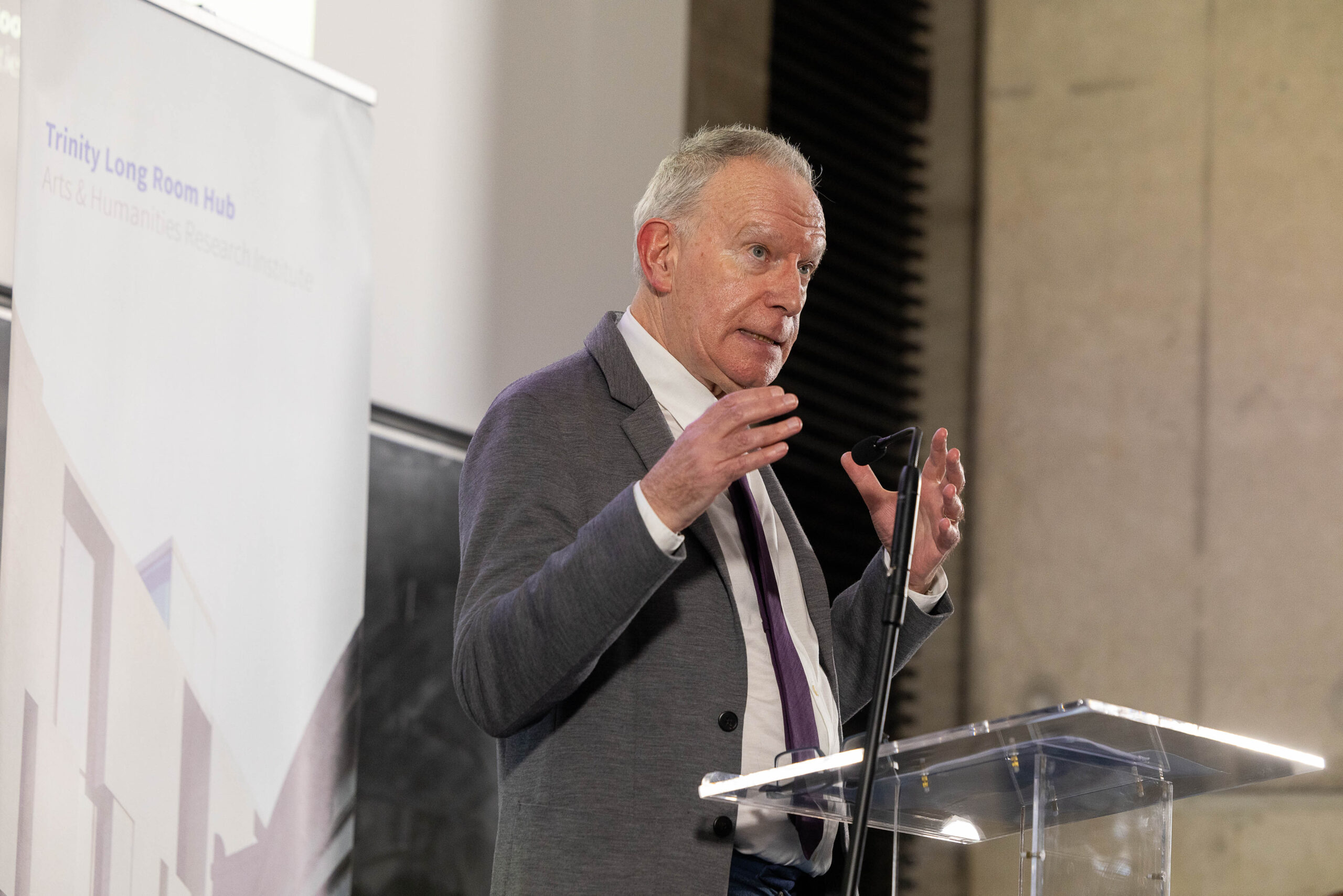Renowned Irish author, journalist, and public commentator Fintan O’Toole delivered the annual Edmund Burke Lecture on Tuesday November 26th to a sold-out audience. The lecture series is supported by the Fallon family in honour of Padraic Fallon, a Trinity alum. O’Toole, who was awarded an honorary degree from Trinity in 2019, has written for The Irish Times since 1988 and has also worked for New York Daily News and The New York Review of Books. The author of many books, most may know O’Toole for his 2021 book, We Don’t Know Ourselves: A Personal History of Ireland since 1958, which was an Irish Times number one book and made The New York Times’ “10 Best Books of 2022”.
Graduating from Trinity College Dublin in 1748, Edmund Burke was a champion for political emancipation. The Trinity Long Room Hub stated that, “One of Burke’s central and life-long concerns was what moral codes should underpin the social order, constrain the use of power and inform our behaviour as responsible citizens. The Edmund Burke lectures provide a prominent forum for contributing in his spirit to the wider discourse about what society we want to live in and what traditions, perspectives and values we need to draw on in the shaping of our future.” Previous lecturers in the Edmund Burke series include Professor Joanna Bourke, former President Mary McAleese, Paul Muldon, Robert Fisk, and Baroness Onora O’Niell.
O’Toole’s lecture’s subject was on “Terror and Self-Pity: The Reactionary Sublime”. He was introduced by Director of the Trinity Long Room Hub Arts & Humanities Research Institute Professor Eve Patten, who listed his numerous accolades and emphasised his significant work as a journalist. O’Toole gave a fascinating lecture, focusing on Aristotle and Burke’s theories of terror, pity, and the sublime as a way to understand the current rhetoric of reactionary politics, particularly those of Donald Trump in the United States.
Using Aristotle’s ideas about terror and pity being the feelings that were purged by Greek tragedies, Burke was interested in what feelings are evoked by works of art. Burke stated “terror is a passion which always produces delight when it does not press too close. And pity is a passion accompanied with pleasure because it arises from love and social affection.” Burke then ties this into the sublime by suggesting that terror is always the ruling principle of such, reshaping Aristotle’s ideas into thoughts about the sublime and the beautiful.
O’Toole explains that Burke suggests the effect of the sublime is not the purging of the terror but is actually the paradoxical experience of terror in a place of safety. This is how Trump successfully has adapted this into a potent form of reactionary politics as Trump’s power is a modification of the sublime. O’Toole states, “Contemporary reactionary politics are a politics of pain. Pain evoked. Pain distanced. Pain rendered politically delightful.”
Before Trump, politics in America had a “grammar of uplift”. What differentiated Trump from this was his aggressive confrontation of this grammar with his visions of the US as a “hellhole” on the verge of obliteration, complete with American carnage. This became particularly apparent when Harris became the candidate. Instead of belittling her on the basis of sex (though he certainly did), he additionally reversed his rhetoric and instead inflated Harris into a monster of terror. By turning her into a mythical monster often conjoining her with the “monstrous” illegal immigrants, Trump utilised a sense of scale – a key feature in the sublime – to convince his followers of the terror they could avoid and the pleasure they could feel from that.
O’Toole’s lecture and usage of Burke’s ideas of the sublime was additionally enlightening when it came to understanding Harris’ loss. He explained that our pleasure in beauty is linked to our capacity for love and beauty is a social emotion. Love and social affection were key in Harris’ campaign and those two emotions are key to pity which is the direct juxtaposition to terror.
So why didn’t it work? O’Toole explained that it’s because of the variant of pity that is self-pity. If democracy depends on fellow feelings, reactionary politics turns this inward and due to a sustained lack of empathy, America, and in turn democracy, has lost pity to self-pity.
O’Toole also touched on the subject of the climate crisis, using the lens of Freud’s writings on the ‘uncanny’ saying that, “The uncanny is now the everyday”. Banal things, like conversations about the weather, are now “pitched between the past tense of lost opportunities and a future of extensional dread”. For both the climate and democratic crises, “the suspension of disbelief has become a form of somnambulism”.
The end of the lecture saw O’Toole take questions from the audience, with inquiries about whether O’Toole thought Trump is “mirage” and how progressives in America and globally could counteract reactionary politics built on terror. Throughout the entirety of the lecture, O’Toole kept the audience engaged and charmed as he joked and made the digesting of such a serious and heavy subject easier. The relevance of the lecture’s topics, particularly in light of the American election as well as how heavy the climate crisis weighs on the global psyche, went perfectly with honouring Edmund Burke and his legacy.







